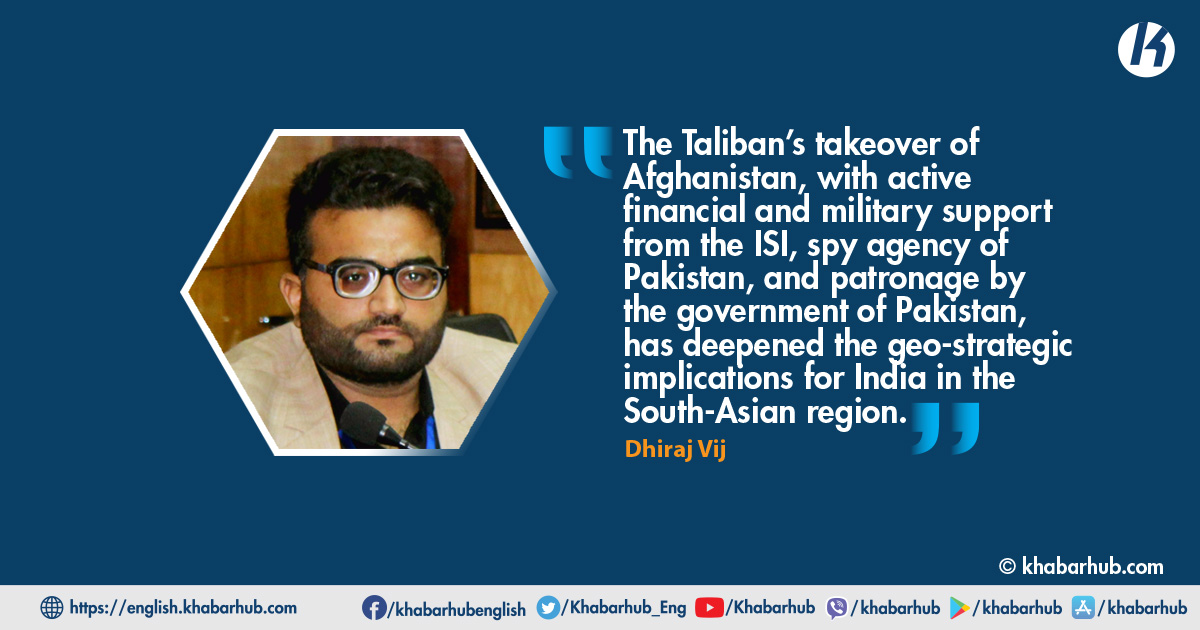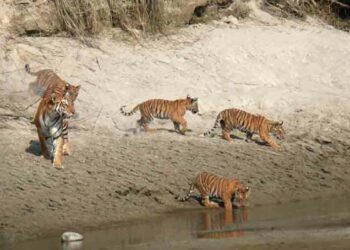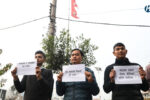With the classic fall of provinces and subsequently Kabul, capital of Afghanistan, on August 15, 2021, into the hands of militant organization Taliban, the manifested new realities of the land of Afghans have sent tremors to the security establishment in New Delhi.
Since the dramatic developments in Afghanistan, rapid fall of Ashraf Ghani led government in Kabul followed by his escape to the United Arab Emirates, hours before Taliban fighters laid siege on the presidential palace in Kabul, the Indian leadership has adopted the policy of careful ‘wait and watch’, and followed the diplomatic tightrope managing its geo-strategic and geo-political interests in the South-Asian region.
The Taliban, a religious and military faction, emerged in Afghanistan in the mid-1990s, after the withdrawal of Soviet forces, and subsequent breakdown in civil order.
With the support of local militant leaders, the Taliban moved ahead and gained control of the southern region of Afghanistan.
With interrupted support from the neighboring states, the Taliban acquired the seat of power in Kabul from 1996 to 2001.
It was, therefore, the terrorist attacks on the United States on September 11, 2001, that compelled the United States, along with its NATO allies, to overthrow the Taliban regime from Afghanistan and establish a western-backed government, led by local leaders, in Afghanistan, for two decades from 2001 to 2021.
The United States also conceptualized active support from Pakistan’s army establishment in its efforts to drive out terror networks from the region.
The US sought an active Pakistan government’s support to its counter-terrorism efforts in return for the financial aid and assistance.
India’s Role in Afghan Development Process
India has always been a significant stakeholder in the affairs of Afghanistan in the last two decades and played the dominant role in shaping the foreign policies of relevant countries concerning the developmental projects and security-related agreements in the region.
India’s diplomatic efforts in the management of its geo-security and geo-political interests, in the last two decades, through balancing Afghanistan as a counter to restraint terrorist groups operating from the Northern Pakistan region in a bid to infiltrate into the Indian territory of Jammu and Kashmir, has suffered a setback amidst the ongoing active involvement of the Chinese leadership in the affairs of Taliban led Afghanistan regime.
India has played a critical role in the national development and establishment of democratic institutions in the war-torn nation.
It has always been in favor of political stability and inclusive governance and even provided feasible aid in training and basic developmental goals.
Since 2001, India has always been at the forefront in providing monetary assistance for the development of Afghanistan and maintenance of peace and stability in the region.
Hence, it can be viewed with optimism within the security establishment, in New Delhi as well as Kabul, that frequent governments, since 2001, have continued their focus on bilateral cooperation and agreements on critical intelligence sharing and developmental projects worth $3 billion in the last two decades.
There were continuous efforts by the local militant leaders to disrupt the ongoing projects like infrastructural development related to dams, hydro-power stations, Afghan parliament building, elementary schools and universities, hospitals, roads and highways, sponsored by India and other nations of the world.
As the international community has been active in providing humanitarian assistance to the war-torn nation, in the last two decades.
There were numerous efforts by the Taliban terrorists, along with the Haqqani network, based in Pakistan, to derail the process of establishment of democratic institutions and relevant human rights in the nation.
It has never accepted the institutionalization of democratic principles, functioning of constitutional provisions and elected government in Afghanistan, women’s rights to work and study and participate in the political affairs of the state.
However, with the decision of the Trump administration to withdraw US forces, declaring a subsequent end to the US war on Afghanistan in 2018, the diplomatic tables have turned so dramatically in the volatile region, that had serious implications for the overall peace and stability of the subcontinent.
The announcement made by President Trump and followed by the swift action by President Joe Biden and his administration had created a strategic dilemma for India to protect its interests in the region.
Thus, India had to face its mighty rival, China, in the diplomatic game on the land of Afghans as the consequence of the withdrawal of US-led NATO forces.
China-Pakistan-Taliban Axis
The Taliban’s takeover of Afghanistan, with active financial and military support from the ISI (Inter-Services Intelligence), spy agency of Pakistan, and patronage by the government of Pakistan, has deepened the geo-strategic implications for India in the South-Asian region.
The China-Pakistan-Taliban Axis have endangered the prospects of Indian interests in the hostile international environment of present times.
As famously said – the ball is in diplomacy’s court and not military’s, reflected the present situation India faces with regard to Chinese intervention in Afghanistan.
The geo-strategic position of India makes it more vulnerable to the infiltration attempts by the terrorists, with active support from the Taliban-led Afghanistan-based groups of militants, from across the region to India.
On July 28, 2021, the meeting between the Chinese Foreign Minister and State Councilor Wang Yi and Taliban delegation led by the head of Afghan Taliban Political Commission Mullah Abdul Ghani Baradar in Tianjin, China, adequately reflected the active role of the Chinese establishment in the political and diplomatic affairs of Taliban led Afghanistan regime.
India’s diplomatic efforts in the management of its geo-security and geo-political interests, in the last two decades, through balancing Afghanistan as a counter to restraint terrorist groups operating from the Northern Pakistan region in a bid to infiltrate into the Indian territory of Jammu and Kashmir, has suffered a setback amidst the ongoing active involvement of the Chinese leadership in the affairs of Taliban led Afghanistan regime.
Although, China has supported the newly formed regime in Kabul, and called for the lifting of all international sanctions placed against Taliban administered Afghan regime and even urged the United States not to use Afghanistan’s foreign exchange reserves as a bargain to exert diplomatic and political pressure on the Taliban leaders.
China, surprisingly, cautioned the hardline militant group to make its government more inclusive called for new Afghan leaders to make earnest efforts and honor its commitments to not allow Afghan soil to operate any kind of terror activities, in any manner, to obtain international recognition to its establishment.
India has always been in support of the notion of the “Afghan-led, Afghan-owned and Afghan controlled” principle, supported the substantial national peace and reconciliation process Programme, concerning the globally recognized democratically established principles for peace and development in the region.
However, with Afghanistan’s territorial integrity and sovereignty at stake under the newly established Taliban regime and the militant groups’ over-dependence on China for economic aid to survive their immediate financial needs, and run their government in the long run, has made the diplomatic game more complex in the region. China, in its first official statement, described the hasty withdrawal of US and NATO forces as the failure of US policy towards Afghanistan.
As famously said – the ball is in diplomacy’s court and not military’s, reflected the present situation India faces with regard to Chinese intervention in Afghanistan.
(Dhiraj Vij, is Ph.D. Scholar, Amity Institute of Social Sciences, Amity University; and Dr. Jyotika Teckchandani, Assistant Professor, Amity Institute of Social Sciences, Amity University)
(Disclaimer: The opinions expressed in the above article are the personal views of the author).









Comment